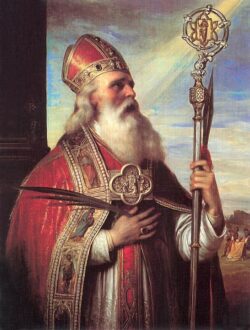Coming from one of the most illustrious families of Bohemia – the western part of what is now the Czech Republic – St. Adalbert intrepidly opposed the sinful individuals that existed within the Church at the end of the 10th century.
Gaudium Press English Edition
Newsdesk (09/07/2022 1:30 PM Gaudium Press) Adalbert was born in 956 and was struck down by a deadly disease in his childhood. His parents made a vow to the Blessed Virgin to encourage him to the priestly vocation if he was cured.
Adalbert recovered his health and, at the age of 27, was ordained a priest by the Bishop of Prague – the capital of the Czech Republic. A few months later that Bishop died in despair, uttering horrible cries and saying that he would be condemned to Hell because he had neglected the duties of his state and sought the pleasures of the world.
Witnessing this terrible event, Saint Adalbert, who was already a virtuous man, resolved to lead a life of greater fervour. His contemporaries claimed that since then they had never seen him laugh.
Chosen to succeed the deceased prelate, he entered Prague barefoot, where he was received by King Boleslaus II, accompanied by a large crowd.
The Diocese of Prague was in a state of horrendous moral decay: part of the inhabitants of the city were idolaters, and those who professed Catholicism dishonoured it by the most shameful vices. The Saint fought steadfastly against sin and in defence of virtue, but the people proved incorrigible. He then went to Rome and obtained from Pope John XV permission to leave the bishopric and enter a monastery.
Martyred by pagans
Five years later, the Pontiff ordered him to return to Prague, declaring that he could leave his flock again if it did not prove docile. Received with joy, the Catholics promised to correct themselves, but soon fell back into the same vices. The Saint decided to abandon them forever and return to the monastery.
Crossing Hungary, he evangelized it successfully. In the town of Esztergom – 50 km from Budapest – he baptised the Magyar nobleman Geza, father of the boy Stephen who later became the first king of that country and a great saint.
However, Pope Gregory V ordered him to take back the rule of the Diocese of Prague. At the news of his return, inhabitants of the city, moved by the evil spirit, massacred several of his relatives, stole their goods and burned their castles.
Saint Adalbert took refuge in Poland and succeeded in converting many idolaters. He then went to Prussia, where part of the inhabitants of Dantzig were baptized. While continuing his apostolate there, in a small village he was attacked by pagans who killed him. It was the year 997.
Today there is indifference and cynicism within sin
We summarize below some comments of Dr. Plinio Corrêa de Oliveira about these facts.
Throughout the Middle Ages, the life of the Church was a struggle. However, she won that fight because generous souls, called by God to make the sacrifice of their lives, said “yes”.
There are times when the Church does not keep up this fight because the souls called to sacrifice their lives to God say “no”, or “perhaps”, which is one of the most detestable ways of saying “no”. The result is that the Church is ill-served and then Christian Civilisation degrades.
The former Bishop of Prague performed his office badly and died in fits of despair in the presence of the young Adalbert, who became a saint.
What does the death of this prelate teach us?
Let us note the difference between the way evil appeared in the Middle Ages and the way it appears today. In our days no one dies in the throes of despair. Sinners equal to or worse than this bishop die listening to music, completely unaware of their responsibilities, saying goodbye to everyone and pretending not to realize that they are dying. However loaded with shame or opprobrium their consciences may be, they die with indifference.
This insensitivity was rarer in the Middle Ages than it is today. Although the Church had to struggle with many souls that were not to be commended, a callous, cynical, simply shameless death, as is the case today, did not occur, or was rare. On the contrary, the wicked died cursing, despairing, or converted and were saved.
That is to say, the particular wickedness of our days is not that one sins a lot, but in the style of sin, in the indifference and cynicism within the vice, which formerly did not exist.
He renounced the episcopate and wanted to become a monk
That bad bishop died giving horrendous signs. What is the result? The observation of these facts does good and shakes the soul of the young Adalbert who, appointed his successor, enters the city of Prague in bare feet and is received with joy by the people, especially by King Boleslaus.
By this manner of taking possession, he wanted to make his execration of the life of his predecessor felt and his intention to be a penitent bishop, while the other had been a debauched, scandalous prelate. It was a manifestation of reaction, an opposition to the sinful element within the Church at that time.
However, Saint Adalbert had to deal with an incorrigible people who resisted his action. So he renounced the episcopate and wanted to become a monk.
He went to Rome and then converted people in Hungary, Poland and Prussia, but he could not get his own people to change their lives.
Bohemia was one of the forces of Protestantism
What is the result and the responsibility of rejecting a Saint? Bohemia remained a bad region right up until Protestantism. Shortly before this heresy, explosions, manifestations of authentic Protestantism began to break out there with John Huss. The Catholics persued John Huss and had him killed, but pre-Protestantism continued to grow in the ranks of the people.
Throughout the struggle against the pseudo-reformation promoted by Luther, Bohemia became one of the forces of Protestantism. Although subject to the House of Austria, it was always a very non-Catholic nation. Separated from the House of Austria, it constituted a republic of a socialist character. The Czech people did not show any ponderable reaction when the communists took over Czechoslovakia in 1948.
Among the Czechs there were very good people, saints, great men of piety, crusaders, splendid vocations. But a bad vein continued and made Bohemia, within the Empire of Francis Joseph (1830-1916), a perpetual problem .
May the martyr Saint Adalbert, whose memory is celebrated on April 23rd, obtain for us from Our Lady the grace to fight with courage against the internal or external enemies of the Church, always saying “yes” to God and never “no” or “perhaps”.
By Paulo Francisco Martos, Notions of Church History
Compiled by Roberta MacEwan


































